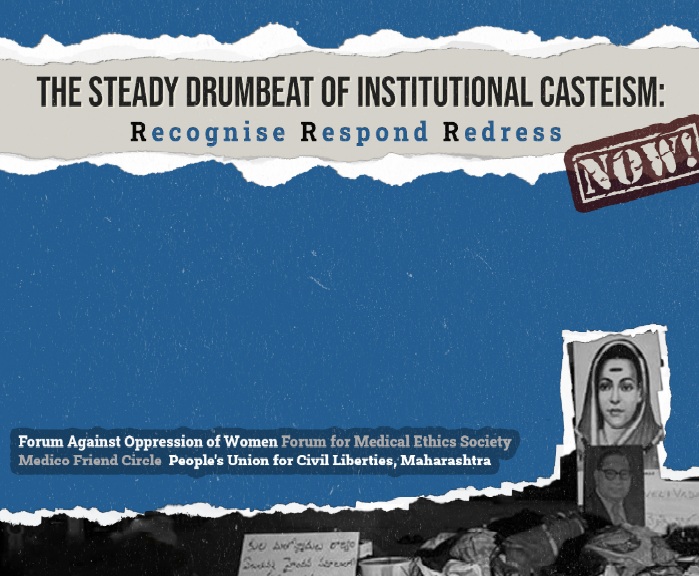 THE STEADY DRUMBEAT OF INSTITUTIONAL CASTEISM: Recognise Respond Redress https://fmesinstitute.org/wp-content/uploads/2021/09/The-Steady-Drumbeat-of-Institutional-Casteism-Recognize-Respond-Redress_Final-report_27Sept21.pdf Report by Forum Against Oppression of Women, Forum for Medical Ethics Society, Medico Friend Circle, & PUCL, Maharashtra
THE STEADY DRUMBEAT OF INSTITUTIONAL CASTEISM: Recognise Respond Redress https://fmesinstitute.org/wp-content/uploads/2021/09/The-Steady-Drumbeat-of-Institutional-Casteism-Recognize-Respond-Redress_Final-report_27Sept21.pdf Report by Forum Against Oppression of Women, Forum for Medical Ethics Society, Medico Friend Circle, & PUCL, Maharashtra
Extracts: Transformative justice’ should form the foundation for strategies to work towards eliminating caste-based discriminatory practices in Higher Educational Institutions (HEI).
This is the conclusion of a detailed report into the experiences of students and employees in medical institutions regarding caste discrimination and the implementation of provisions mandated to check discrimination against SC & ST students.
In the Payal Tadvi case, the hospital and college authorities were negligent and ineffective in taking action against the accused doctors. The Maharashtra state government, the Medical Council as well as other authorities were lax in taking ahead the court hearings. This incident is a result of neglect on the part of the Institution to address the discrimination, humiliation, harassment and violence that doctors like Dr Payal Tadvi face.
Caste and ‘caste consciousness’ is deeply embedded in our psyche and our way of thinking. Often, we are not conscious of the way our thinking manifests in our behaviour. At times, even those viewed as liberal and progressive fail to look at the experience of dalits or adivasis in the framework of structures or system.
A highly competitive system layered with inherent casteism has led to a peculiar situation in medical colleges where we see particularly rampant discrimination, alienation, and even incidents of self-harm by students from marginalised communities pushed to the corner.
Increasing privatisation of medical education and health care impacts the lives of those from marginalised sections of society who accessed admissions via reservations.
There is a culture of not naming and acknowledging discrimination runs across all marginalisations. This is built on caste based envy/jealousy, but more starkly a belief that blinds most dominant communities to the impact that caste discrimination on the system and that, in a extremely competitive field, the few seats reserved actually belong to the dominant community and that they are entitled to it, purely based on the marks and assessments which have actually favoured the dominant community in the first place.
The current dominant narrative denouncing reservation policy can only be altered by including liberal studies education about existing structural inequities in the medical curricular as well as those of other streams.
We need to treat caste-based discrimination and institutionalised caste-based discrimination as violation of constitutional rights of individual students, especially from the marginalised castes, tribes and minority communities.
